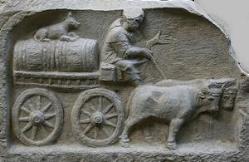- Quelle Buck: Rodden, Rhone. Rodanus (falsch Rhodanus). Vielleicht aus der Wurzel rad (graben) oder gall. Wurzel rad, rid (laufen).
- Quelle Eberl: Reute, w., ahd. riuti, mhd. riute, die Rodung (durch Ausstocken); das Reut, ahd. riut, rüt, das Rodeland. Gereut = Kreut, ahd. gariuti; das Raut, das ereutete = Reut.
- Quelle Schnetz: Die Farbe des Geländes oder der Gewässer kommt zum Ausdruck in den FlN ... Rotenfels Rothach (Rottach), Rötenbach = Rettenbach, auf der Röte, Roting (zu trennen von "roden" bezw. dem Fischnamen Roth = Rotte und von dem PN. Roth; doch entscheidet meist die Mundart)
- Quelle Vollmann: Rodungen ... doch sind diese N. oft schwer zu scheiden von den mit dem Eigenschw. "rot" gebildeten N. (Fluß=N., Roth, Rott(ach), Rothenbach = Röthenbach, Rettenbach u. a. nach der braunroten Farbe des Moorwassers (Rothfeld am Fluß Roth), und bei manchen FlN. kommt auch rotten "Flachsrösten" in Frage (Rottstraße S. 55).
- Quelle www.libraryireland.com/plnm/placenamesR.php
Ramoan in Antrim; Rath-Modhain, Modan's fort.
Rath [raw], a circular fort; rath, raw, rah, ray, ra, raha
- Quelle www.tara.tcd.ie/bitstream/2262/3921/1/jssisiVolXII263_294.pdf
RATH.-There are about 48 Townlands named RATH, and over 700 where RATH is the initial syllable of the name. In Irish it is rath, " a fort" or " fortress," as Rathcormack, tath Connate, " Cormac's rath or fort." There are 88 Townlands named Raheen, which signifies " a little fort." A similar word occurs in Scotch Gaelic topography, as Raithburn, " fort of the stream " (Ayrshire)
- Querverweis, siehe dazu auch
 Reijdn unter Ortsnamen
Reijdn unter Ortsnamen
